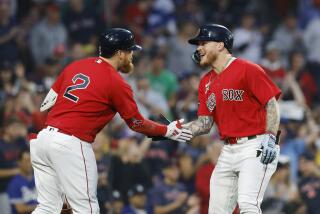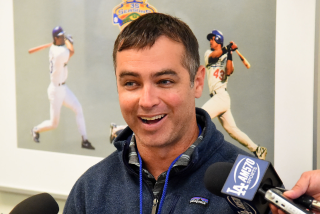TRYING TO GET HOME : Born in the Majors, Chris Cannizzaro Jr. Has Been Attempting to Return as a Player
- Share via
SAN DIEGO — To say Chris Cannizzaro Jr. grew up with baseball is like saying that Hank Williams Jr. grew up with music, or that Edsel and Henry Ford II grew up with cars.
On Feb. 23, 1962, Christopher John Jr. was born the first son of New York Mets catcher Chris Cannizzaro Sr. He was the first newborn for a member of the National League expansion team.
“On my birthday, until I was about 5, all the old Mets used to send me presents,” Cannizzaro said. “I think my mother still has some of them.”
A few years later, Chris Jr. went on trips with his father, playing catch and taking batting practice in every National League park.
On the Padres’ first opening day in 1969, Cannizzaro, then 7, sat in San Diego Stadium with his mother, Beverley, and his younger sister, Kimberlee, and watched Chris Sr. catch the first game in Padre history.
Twenty years later, Chris Sr. is hoping to someday watch his son play major league baseball. But there remains a question about when, and even if, that is going to happen.
After successful years at Patrick Henry High (where he was an all-section shortstop while leading the Patriots to the 1980 3-A championship) and San Diego State (where he was an All-American second baseman in 1982), Cannizzaro is in his seventh season in the Boston Red Sox minor league system.
Having spent the past 3 1/2 years with triple-A Pawtucket, Cannizzaro is still waiting for that first major league swing.
“When you’re a kid,” Cannizzaro said, “you don’t really think about what you’re going to do for a living. I never really expected to be in the big leagues. I just enjoyed playing the game. It was a way of identity for me. It was what I did. That’s what I was associated with. I think baseball kept me clean and out of trouble, at least somewhat.”
Patrick Henry Coach Bob Imlay said that because of Cannizzaro’s early association with big leaguers, “He was the most polished, skill-wise and emotionally, kid I ever had. He told me his dad never pushed him, but he learned a lot just by watching and mimicking the big leaguers. He was led by example.
“He never wasted any time on the field. He was always working on something. I remember him telling me once that Pete Rose was his idol. Because of his style of play, of course.”
Cannizzaro is 5-feet-8, 170 pounds, short and slightly stocky. His primary position is second base, although he can play any infield position and has been used in the outfield.
He is a switch hitter who uses the whole field from both sides of the plate. He hits for average, scores a lot of runs, makes things happen with his heads-up style and hits occasional home runs.
Batting third for Pawtucket, which plays in the International League (known for low batting averages) Cannizzaro leads the team with a .270 average and 29 runs batted in. For whatever reason, and Cannizzaro could not explain it, he had no home runs in his first 200 at-bats this season after hitting eight last year. But in his next 38 at-bats, he hit five and had his first two-homer game as a professional last week.
“He plays every game like it was his last,” Chris Sr. said. “And that’s the only way I ever taught him. I never pushed him into baseball. He always wanted to play. He always had enthusiasm. The only advice I gave him was to play hard.
“Sure, I taught him the intricate parts of baseball, like where to play a certain batter and what to do with a three-and-one pitch, but Chris is his own person. He’s done it being Chris Cannizzaro Jr. not because of Chris Cannizzaro Sr.”
At Patrick Henry, Cannizzaro hit in the low .400s and was awarded the team captain trophy after the season (Detroit Tiger catcher Matt Nokes was the most valuable player). Cannizzaro was not drafted and received no scholarship offers.
He instead walked on at SDSU and made the varsity his freshman season. By his sophomore year, he had established himself as one of the best second basemen in the nation. He made the American Baseball Coaches Assn. All-America team after batting .348 with 101 hits (second best in Aztec history at the time), 48 RBIs, 68 walks and 30 stolen bases.
His junior year was considerably better, but he was left off the All-America team. He hit .363 (98 for 270) with four home runs, 60 RBIs, 83 walks and 39 stolen bases.
“Those were the learning years,” Cannizzaro said. “Coach (Jim) Dietz was a very dedicated coach. I learned a great deal from him.”
At SDSU, Cannizzaro played with future big leaguers Tony and Chris Gwynn, Bobby Meacham, Al Newman and Mark Williamson. The Aztecs were always in the top 20, reaching No. 1 for about a month during Cannizzaro’s junior year.
After his junior year in 1983, Cannizzaro was invited to play for the U.S. all-star team, which would become the 1984 Olympic team. But he also was drafted in the ninth round by the Red Sox.
“It was the hardest decision I had to make up to that point,” he said.
Cannizzaro chose to forgo both his senior year and the Olympics and sign with Boston. That summer and the next, he played Class-A ball in Winter Haven, Fla.
In 1985, he was promoted to double-A in New Britain, Conn. After one year, it was on to Pawtucket, where Cannizzaro has been for 3 1/2 years.
“I never put any timetable on making it to the majors,” he said. “But I thought because of how fast I got to triple-A, that I would be there by now.”
He added, “No question, it gets frustrating. But if you dwell on that, that you’re one level away from your goal, you’re going to hurt your performance on that level. Of course, I want to play in the big leagues, but more importantly I want to enjoy life. I want to be happy. And right now, playing baseball on any level is enjoyable. It makes me happy.
“I’ve had an enjoyable minor league career. The only bad part is I’ve been bypassed by the big club three or four times.”
Once was about a month ago. On June 4, Boston’s regular second baseman, Marty Barrett, suffered torn cartilage in his right knee and was placed on the 21-day disabled list.
Cannizzaro, then hitting around .280, thought he surely would get the call. He felt he deserved to be called up. He had performed consistently well at the highest level of minor league baseball for four seasons. He was ready.
The Red Sox opted for Pawtucket’s shortstop, Luis Rivera.
“When Marty Barrett went down, I thought, ‘This is it.’ But they bring up a shortstop who’s hitting .250 and I’m hitting .280 at the time. I understand (management’s)thinking. They had traded for (Rivera) last winter. He has a year of big league experience, and he was the last one cut from spring training.”
Cannizzaro made it to the second-to-last cut.
So what happens?
“He goes up there and tears it up,” Cannizzaro said. “And I’m happy for him. But that tells me I could do the same thing.”
Despite his lengthy stay in triple-A and his being passed over on a number of occasions, Cannizzaro is not bitter toward the Red Sox management. But neither is he happy. He has asked to be released or traded, but each time management has refused.
After this season, his seventh in the minors, he will become a free agent. But he is uncertain of his future.
“I’ve learned that the only thing that is certain, is that nothing is certain,” he said. “If I retire, having never made it, but knowing I was a good triple-A ballplayer, that’s OK, I can live with that.”
More to Read
Go beyond the scoreboard
Get the latest on L.A.'s teams in the daily Sports Report newsletter.
You may occasionally receive promotional content from the Los Angeles Times.










